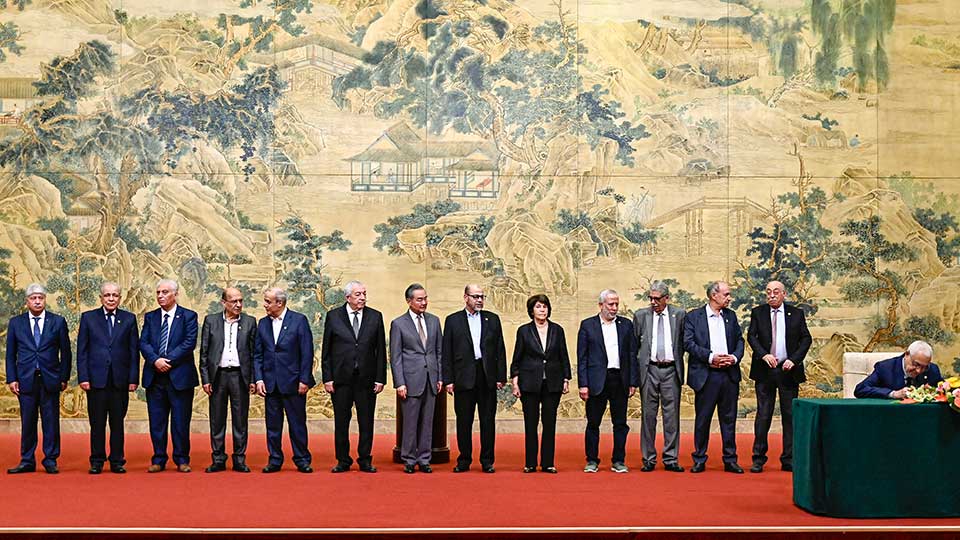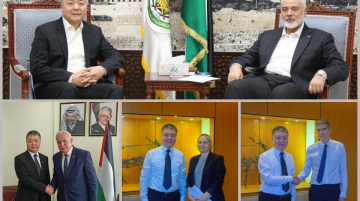
By Amanda Xinyi Chen
On July 23, 2024, Israeli Prime Minister Benjamin Netanyahu began his visit to the United States, where he delivered a forceful address to the U.S. Congress to drum up American support for his country’s war in the Gaza Strip. That same day, across the world in Beijing, representatives from Hamas, Fatah, and 12 other Palestinian groups concluded talks aimed at reconciliation and national unity. After three days of dialogue and in the presence of Chinese Foreign Minister Wang Yi, all 14 Palestinian factions signed a joint declaration aimed at establishing an interim national reconciliation government.
This agreement, the “Beijing Declaration on Ending Division and Strengthening Palestinian National Unity,” or more simply the “Beijing Declaration,” was praised by Chinese diplomats, media, and experts as a crucial step toward resolving the Gaza conflict and a notable success for Beijing’s “great power diplomacy.” Similarly, Hamas officials, such as international spokesman Husam Badran, expressed optimism, with Badran stating:
“This [agreement] creates a formidable barrier against all regional and international interventions that seek to impose realities against our people’s interests in managing Palestinian affairs post-war.”
Conversely, while many Western commentators expressed skepticism and concern over increasing Chinese influence in the Middle East, their analyses were relatively muted compared to the largely negative and dismissive responses from Israeli media.
Overall, the Israeli press dismissed this intra-Palestinian unity deal, with many outlets providing minimal coverage. This response likely stems from a consensus among Israeli commentators who believe, as with past agreements, that effective collaboration between Fatah and Hamas is highly unlikely.
Additionally, many Israeli analysts criticized Beijing’s role in facilitating the talks, arguing that it could bolster Hamas’ position in the Palestinian territories and undermine the US-brokered normalization process with Saudi Arabia. This reaction is unsurprising given the widespread sense of betrayal among Israelis over Beijing’s firm pro-Palestinian stance following the October 7 attack and China’s lack of effort to prevent the subsequent deterioration of Sino-Israeli relations.
Reconciliation Between Fatah and Hamas?
The Beijing Declaration received scant coverage in Israeli media. The most prominent outlet to report on this China-sponsored agreement was The Jerusalem Post. The conservative English-language newspaper had initially broken the news about the intra-Palestinian talks in Beijing on July 16, urging skepticism due to the failure of China’s previous attempt to mediate between Fatah and Hamas back in April. The Jerusalem Post also argued that it would be unlikely for Fatah, which has criticized Hamas’ October 7 attack since the beginning of the Gaza War, to reach an understanding with its long-time political rival.
Indeed, during a recent appearance on the Fatah-affiliated network Awda TV, Jamal Nazzal, Fatah’s spokesman in Europe, accused Hamas of “sacrificing Palestinian lives without the consent of civilians.” He added that if the Islamist group had not undermined the Oslo Accords, Palestinians would have achieved “true independence and a fully sovereign state.”
This negative assessment of Palestinian reconciliation was widely echoed in Israeli media in the following days. For example, i24NEWS journalist and Arab affairs analyst Zvi Yehezkeli argued that the Beijing Declaration could hardly be considered a success for China or a significant development for Palestinian politics. On the contrary, he suggested that the only reason Palestinian President Mahmoud Abbas accepted the agreement was to diplomatically appease Beijing, which has supported Fatah and the PLO since their inception:
“Hamas is now on its knees, so it is ready to accept any agreement. If [Mahmoud] Abbas waits, he will receive the Strip even without a temporary government. [So] it’s just to appease the Chinese. The Chinese have proven they want to intervene in recent years.”
But why are the Chinese engaging with Hamas now, after keeping a cautious distance since the war began? Yehezkeli explained that Beijing’s outreach is a pragmatic move, consistent with its well-established modus operandi in international conflicts. By establishing contact and maintaining good relations with all parties “before one of the sides is erased,” Beijing aims to secure a foothold in any post-war scenario.
According to Yehezkeli, Fatah is aware of this strategy. In other words, the Beijing Declaration stems from the pragmatic strategies of both parties, focused on short-term goals of preserving influence and security power rather than a genuine long-term plan for Gaza and Palestine.
This thesis is shared by others. Journalist Jack Khoury, writing for the liberal daily newspaper Haaretz, reported that a senior Fatah official disclosed that “the joint statement was mainly intended to show respect to the Chinese hosts, similar to past agreements announced in Moscow and Algeria.
Therefore, it does not hold much practical significance.” In fact, neither the Palestinians nor the Chinese have outlined specific roadmaps or detailed future steps. The biggest challenge remains determining who will oversee security in Gaza once the war ends.
Nevertheless, additional unnamed Palestinian sources cited by Khoury clarified that, despite the symbolic nature of the Beijing Declaration, Palestinians are making a genuine effort to reform the ailing national council and make it more inclusive.
This push aims to address the Palestinian Authority’s legitimacy crisis and prepare for a post-war scenario. The sources also added that Hamas representatives have previously conceded to cooperate if a new Palestinian government was established. The only question now is how and what role China could or should play in this process, if any.
In another example of the dismissive attitude of Israeli commentators toward the Beijing Declaration, Guy Ulster, the head of the foreign desk of Walla! News wrote that:
“This is not the first time that Hamas and Fatah have signed agreements to establish unity governments, which did not result in change on the ground. [In fact,] similar agreements signed in recent years did not yield tangible results.”
A further example is the article by Galia Lavi, the Deputy Director of The Diane & Guilford Glazer Israel-China Policy Center at the Institute for National Security Studies. In her article, she argued that “none of the parties participating in the “reconciliation talks”—guests and hosts alike—have a real interest in their success but rather in their very existence and continuation.” According to Lavi’s analysis:
“For Fatah, the talks provide a platform for discussing leadership in “the day after” the war in Gaza while enlisting China to continue the struggle in the UN for Palestinian rights. For Hamas, the mere existence of the talks and hosting a senior delegation in Beijing provides it with international legitimacy and possibly a place in a future settlement in Palestinian leadership in “the day after.” For China, the “reconciliation talks” allow it to present itself to countries belonging to what it calls the “Global South” as a responsible power and an effective “mediator” that cares about the rights of the Palestinian people.”
China in the Middle East and the Future of the Saudi-Israel Normalization
While the agreement might not lead to any real change, some Israeli commentators viewed China’s involvement as a troubling sign. Although not openly criticizing Beijing’s intervention in the Israeli-Palestinian conflict, both Ohad Merlin and Seth J. Frantzman, writing for The Jerusalem Post, agreed that China’s mediation undermines Israel’s international standing and that of the Western Bloc led by its ally, the United States.
Specifically, Chinese mediation between rival Palestinian factions is viewed through the lens of Washington’s efforts to revive normalization talks between Israel and the Kingdom of Saudi Arabia, which have stalled due to the ongoing war. China’s priority, on the other hand, is to preserve stable relations between Tehran and Riyadh, as well as encourage their alignment over Gaza—something that Israel cannot accept.
Ohad Merlin argued that a potential Israeli-Saudi normalization under the American aegis would severely undermine Beijing and its interests in the Middle East (China imported $54 billion worth of energy from the Kingdom in 2023). With Beijing now engaged in a “new Cold War” with Washington, it perceives Hamas as a strategic asset for its anti-Western bloc and has an interest in ensuring the Islamist group remains influential. In other words:
“Promoting Hamas-Fatah rapprochement sends a message of ‘uniting the bloc,’ and taking charge of the affairs of the so-called ‘Global South’.”
For his part, Seth J. Frantzman expressed concern that China’s actions may strengthen Hamas and its supporters, potentially bolstering its foothold in the West Bank—a scenario that most Middle Eastern governments, including Fatah leaders, quietly oppose. One could infer that Israel should thus pay closer attention to the Beijing Declaration instead of dismissing it outright. Commentators like Frantzman worry that the Chinese deal could represent an additional international obstacle to Israel’s goal of eradicating Hamas from the Gaza Strip. Indeed, political recognition from powerful countries like China could further bolster support for the Palestinian militant group. As Frantzman put it:
“This is why the Beijing meetings are important. Hamas has not been isolated because of the atrocities of October 7, rather it has been strengthened in some ways. The Beijing meetings were an example of this strength and clout.”
Against this background, Israeli Foreign Minister Israel Katz harshly criticized Fatah’s engagement with Hamas on X, accusing President Abbas of condoning terrorism. Katz underscored in his post that “Hamas’ rule will be crushed, and Israel’s security solely remains in Israel’s hands.” While Katz did not directly mention Beijing, there is little reason to doubt that its role hosting the Palestinian delegations and facilitating the agreement likely did not help China to score any diplomatic points with Israel.
The sole somewhat positive coverage of the Beijing Declaration came from the newspaper Maariv, which published an article on the same day the agreement was signed. In this piece, featuring comments from Hamas spokesperson Abu Marzouk, a limited and implicit positive view of the declaration could be deduced.
It seems to suggest that Hamas’ willingness to cooperate with Fatah in Beijing might be seen as a constructive step forward for the Palestinian cause, potentially benefiting Israelis who support a two-state solution and a fair peace process—objectives that China strongly advocates.
Conclusion
The China-promoted reconciliation agreement between Fatah and Hamas received a frosty reception in Israeli media. While Israeli commentators were careful not to directly attack or criticize China, many dismissed the deal, arguing that it is unlikely that the two rival Palestinian factions will overcome their deep-seated disagreements to form a functional national government.
However, other commentators underscored the broader implications of China’s involvement in the Middle East and the agreement’s implications for Israel’s long-term strategy vis-à-vis the Palestinians. Despite some arguing that the declaration was a potential gesture of goodwill from Hamas toward endorsing a two-state solution, most expressed concern that China’s support could embolden international terrorism if the militant group fails to genuinely cooperate with the Palestinian Authority. This could further complicate Israel’s already complex negotiations with Saudi Arabia over normalization.
Moreover, in contrast to the Israeli media’s vocal reaction of shock toward Beijing’s position on the Hamas-led October 7 attack, the Israeli response to the Beijing Declaration was notably more subdued. This could be due to the significant deterioration in Sino-Israeli relations (62% of Israelis hold an unfavorable view of China, up from 46% in 2022) and the general fatigue among the Israeli public after 300 days of war.
Amanda Xinyi Chen (陈心怡) is a research fellow at the ChinaMed Project. She is also a graduate student of the Sciences Po-Peking University Dual Master’s Degree. Her research interests include Chinese diplomacy in the Middle East and broader China-Middle East relations.






